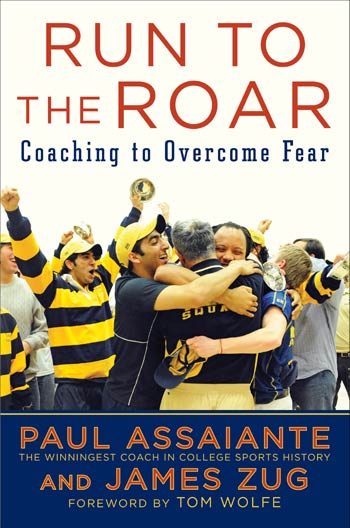 Hartford, CT — Paul Assaiante and James Zug have teamed up to write Run to the Roar: Coaching to Overcome Fear, which was recently published by Penguin.
Hartford, CT — Paul Assaiante and James Zug have teamed up to write Run to the Roar: Coaching to Overcome Fear, which was recently published by Penguin.
Assaiante is well known in the squash world. He has coached Trinity College to twelve consecutive Men’s National Team Championships (Potter Cups) and the team has the longest win streak, currently 224 matches, in collegiate sports history.
Zug, Squash Magazine’s senior writer, is also well known to squash fans. He played collegiate squash at Dartmouth College, and in 2003 he wrote Squash: A History of the Game.
Assaiante and Zug worked on the book for seven years and decided to tell Assaiante’s life journey through the dramatic 2009 Potter Cup final between Princeton and Trinity. Each of the book’s nine chapters covers a match from the National Championship along with Assaiante’s life lessons, background, and experiences.
Run to the Roar is about more than just squash. Each chapter discusses mental challenges, teamwork, and motivation.
Recently, the College Squash Association had a chance to talk with Assaiante. Below are excerpts from our interview.
CSA: Run to the Roar chronicles your coaching journey, the 2009 match between Princeton and Trinity, and your relationship with your son Matthew, who has struggled with drug addiction. Was it difficult to discuss your relationship with him?
PA: It was very difficult to write about Matthew’s personal struggles, and even tougher for his brother and sister to read, since much of what is in the book they didn’t know. This because I felt I needed to protect them from the side effects of addiction on the family, at the time. But in addition, I felt obligated to share his story because I felt that I had let him down by being overly focused on my work.
To be successful you must live a balanced life … and that is success on the spiritual level. Focusing on one thing at the exclusion of other much more important things has a cost. Jim Zug and I thought that this needed to be shared.
CSA: You are very honest and explain how you had never heard of squash prior to being hired at Army. How did learning the game as an adult influence you as a coach?
PA: There is some great benefit to learning an activity once you are old enough to truly learn. Coming to squash and tennis from gymnastics was a much easier step as that is such a tougher overall body activity.
CSA: Speaking of Army, you had some strong teams. Do you think they will return to college squash someday?
PA: The loss of Army’s team has hurt all of us in collegiate squash (great crowds, great history and it was great to have a government-run institution know and care about squash), and especially Navy for squash which has keen missed having its huge rival. It was so sad to see Army drop squash, especially when you consider that we had 22 courts there. The courts however no longer exist and I do not see squash coming back to Army any time soon and that to me is a tragedy.
CSA: You wrote about living in the moment and not writing the outcome prior to an event’s conclusion. How challenging is it to have your players live in the moment, especially with the 224-match win streak?
PA: For me to ignore the streak has been easy as I am not wed to winning and losing. I only want to touch students and help them to learn life lessons in sport. For the students it is much tougher as they do not want to be the team that had the streak end on their watch. We talk about it a great deal as it truly means nothing to our “today,” and all that we can do is to be the best version of ourselves each and every day.
CSA: A big component of your Trinity squad has been international players. As you point out, many schools, including Ivy League schools, have traditionally had international players. Do you see teams like Franklin & Marshall and Rochester, which have recently both recruited many international players, as similar to your Trinity teams in the late 1990s? If so, do you have any advice for these teams?
PA: The international aspect of our college game is good for the game, and I so look forward to the day that the best players in college squash and in the world are home grown. There are some wonderful players out there now, like Todd Harrity [of Princeton] and Chris Hanson [of Dartmouth], and many more in the pipeline, so perhaps we will see a shift in the future. But until that time, schools that are willing to look to diversity are going to benefit from the strength of the international student.
John White at F&M and Martin Heath at Rochester are doing a great job in this area and we are also see a far greater number of young men and women at Harvard, Princeton, Yale, Cornell, etc. The interesting thing is that in Division I tennis this is even a greater factor, and we are simply a step behind them.
CSA: Throughout the book, it is obvious how much you care for each of your players. How do you go about relating to players and how much interaction do you have with them on a daily basis? Also, do they learn more from you or do you learn more from them?
PA: I have clearly learned more from my guys than they have learned from me. These are wonderful guys, who are highly focused on academics, student life, working on campus, being RA’s. When I arrived at Trinity in 1994, our team had one of the lowest average GPAs, and now it has one of the highest.
Because these boys are so far away from home, I truly do become more than just their coach. Christmas, holidays, illness, happy days, sad days are all part of our shared four-year journey.
Their parents have entrusted me and the college to watch over them, as surrogate parents, and this is not only a responsibility [but] a privilege.
CSA: It is interesting how you do not let parents watch practices. Does this ever create tension with your team or their parents?
PA: To me practice is our sacred classroom. I need to do whatever is needed on each and every day, to get the boys’ attention. Sometimes that is not pretty, and I do not need parents watching over my shoulder. I do not go to their offices on work days, and they need to stay out of my classroom. Actually it is very well received and generally respected by the parents.
CSA: Early this year Trinity College dedicated the “Paul D. Assaiante Tennis Center.” What did that honor mean to you?
PA: Yes, the school decided to name the new tennis center after me, and that really touched me. But this because my dad, who was my hero, loved tennis. Every time I see the center I think of him. That is the gift.
CSA: Coaching is about working with people. You discuss so many coaching lessons, such as referring to the team as “we,” living in the moment, and communicating with your players. What do you hope someone not involved with squash will learn about interacting and working with teams, both in sports and in professional jobs?
PA: I truly think that the messages of this book are applicable to life. Managing fear … we face fear every day, learning to face your problems both personally and professionally, are all day-to-day issues.
I hope this book reaches a wider range of people and moves them!
CSA: When the streak ends, how will you feel?
PA: When the streak ends I will be thrilled. Truly! We can get that behind us and let the boys truly enjoy just sharing this moment. Who knows … it might be this year.





